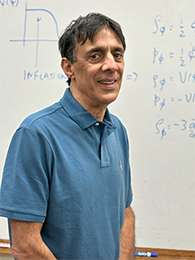K-State physicist wins prestigious Lilienfeld Prize from American Physical Society
Wednesday, Oct. 16, 2024
MANHATTAN — Bharat Ratra, university distinguished professor of physics in the College of Arts and Sciences at Kansas State University, has been selected to receive the American Physical Society's 2025 Julius Edgar Lilienfeld Prize for outstanding contributions to physics and exceptional skills in lecturing to diverse audiences.
"This prestigious award recognizes Dr. Ratra's exceptional research, teaching and engagement," said Chris Culbertson, dean of the College of Arts and Sciences. "We are proud of his excellent work and this well-deserved distinction."
Ratra is being recognized for his pioneering research in cosmology and particle astrophysics, including on the quantum mechanics of inflation and dark energy dynamics, and his contributions to science education and popularization at all levels.
"One of the amazing things about Dr. Ratra is that he can switch from working on some of the most profound, complex physics problems ever taken up on a Tuesday to explaining the very same ideas in everyday language to a roomful of eighth-graders on a Wednesday," said Tim Bolton, head of the physics department at K-State. "We are so grateful to have him on our faculty."
Ratra will be presented with the prize, including $20,000 and a certificate citing his contributions, at a ceremony in Washington, D.C., on Jan. 30, 2025. As the prize recipient, he will deliver an invited talk at the APS Global Physics Summit in March and lectures at a research university and a predominantly undergraduate university.
During his nearly 40-year career in cosmology, Ratra has given hundreds of invited presentations to diverse audiences around the world and has published more than 150 scientific articles. He is a fellow of the American Physical Society, the American Association for the Advancement of Science and the American Astronomical Society. He has received K-State's Commerce Bank Distinguished Graduate Faculty Award, the Olin Petefish Award in Basic Sciences and the Kansas Science Communication Initiative Science Communication Award.
In 1988, Ratra and James Peebles, the winner of the 2019 Nobel Prize in Physics, proposed the first dynamical dark energy model. Dark energy is the leading candidate for the mechanism that is causing cosmological expansion to accelerate.
Ratra is more than a scientist; he is also an educator who is dedicated to teaching and public outreach. He has engaged with thousands of school children, college students and members of the general public, and he's attracted renowned scientists to the university to give non-technical, public lectures that have drawn large, diverse audiences.
He also directs K-State's QuarkNet program, funded by the National Science Foundation, to provide professional development for science teachers and outreach to high school physics students in Kansas and Arkansas.
"I hope that my winning this prize will help publicize and strengthen the great cosmology research and science outreach programs we have built at K-State," Ratra said. "Dark energy, dark matter and the Big Bang model are topics that resonate with the general public and high school and K-State students, and sharing the excitement of cosmology and physics, as well as our innovative research with them, supports our mission to be a next-generation land-grant university."
Ratra joined Kansas State University as an assistant professor of physics in 1996. He earned his master's and doctoral degrees in physics from the Indian Institute of Technology in New Delhi and Stanford University, respectively. He was a postdoctoral fellow at the Stanford Linear Accelerator Center, Princeton University, California Institute of Technology and Massachusetts Institute of Technology.

